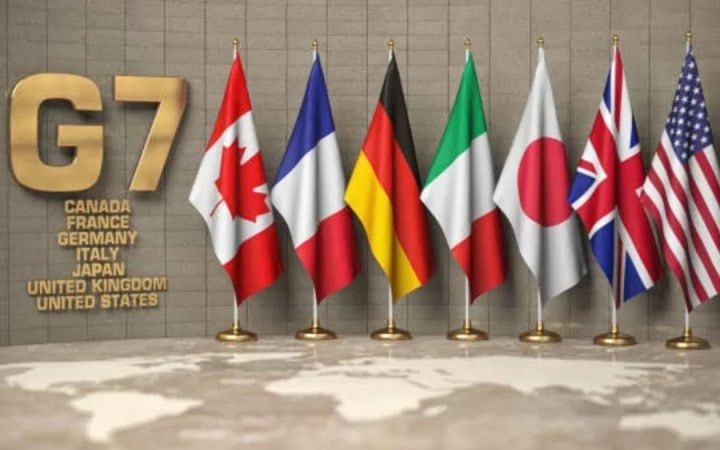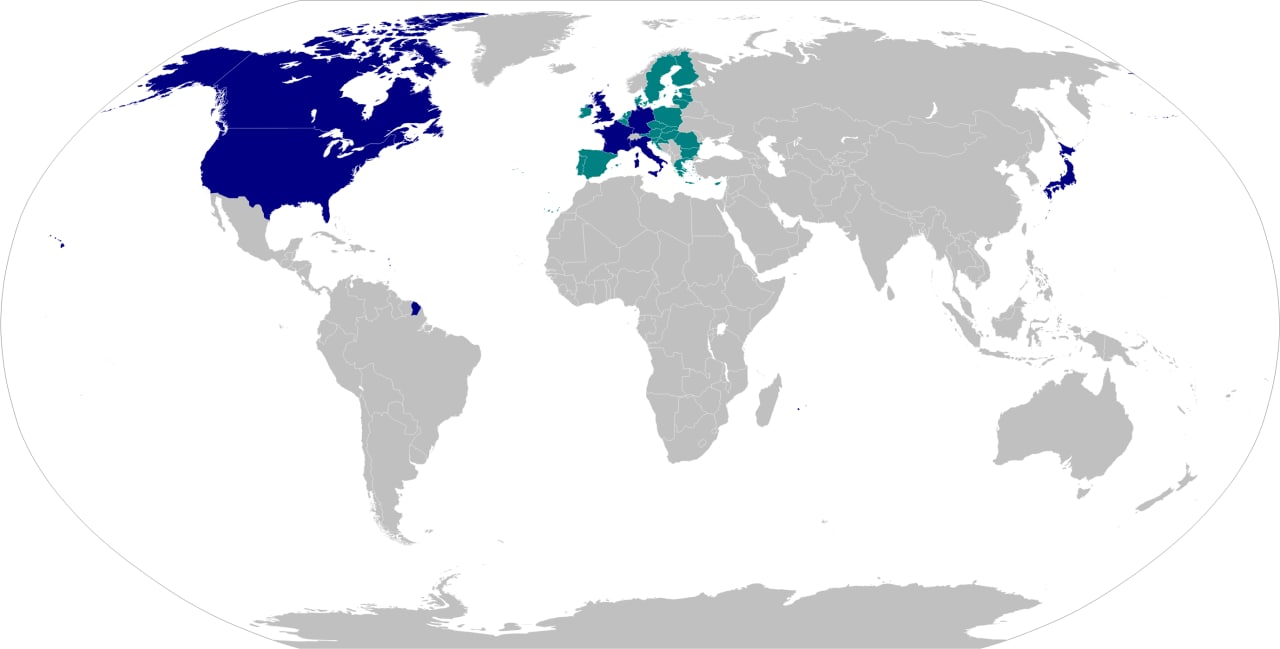WHAT ROLE DOES THE G7 PLAY IN THE GLOBAL ECONOMY?
- George Solotarov
- Hits: 364

The Big Seven or G7 is a kind of club, which includes the most industrialized countries of the world. This association does not have the status of an official international organization and the corresponding statute. Consequently, all decisions made by the club are not binding.
THE REASONS FOR THE FORMATION OF THE G7
By 1991, the long period of the so-called "Cold War" between the U.S. and the Soviet Union was over. In addition, the balance of power in the world economy had changed - as of 1955, U.S. GDP was equal to 59% of the total GDP of nine leading countries, including China and the Soviet Union. By the 1970s, the share of the United States fell to 44,6 percent, and by the 1980s it was 41 percent. Nicholas Bain, a British researcher, singles out three reasons for establishing the G7: To provide collective management of the world economy. To ease the friction caused by the growing interdependence of the countries based on external factors affecting their economy. But we have to understand that in creating the union, each of the member countries pursued strictly personal goals.
G7 - THE G7 LIST
- G7 countries:
- United Kingdom
- Germany
- Italy
- Canada
- USA
- France
- Japan

In 2006, Russia became a member, and the G7 became the G8. But in 2014, after Russia annexed Crimea, the West refused to participate in the G8 format, and the other member countries of the alliance began to meet without Russia. In June 2020, Donald Trump, as president of the United States, suggested that Russia return to the G7, but the other G7 member countries did not support the idea. Meetings are held annually in one of the presiding countries. Representatives of the EU also take part. The agenda is drawn up by the representatives of the governments.
THE G7 OBJECTIVES
The unique feature of this association is that it does not have a statute and, therefore, official status cannot be obtained. Countries joined the G7 when they were invited to hold a summit on their territory. Over more than 40 years of its existence, the role of the U.S. has changed because of changes in the international situation in the world. When Washington was at the height of its power, it put forward various initiatives and essentially forced other countries to accept them. But this does not mean that the U.S. ruled the world alone - other leaders had opportunities to influence world processes as well. The purpose of the G7 is to seek different solutions to economic and political issues and agree on a common strategy and recommend that other countries follow it.

SO WHY IS A G7 SUMMIT TAKING PLACE?
The idea of a G7 summit emerged in the early 1970s because of the economic crisis and the aggravation of economic relations between Western Europe, the United States, and Japan - there was a need for greater coordination in developing a mechanism that would help overcome economic difficulties. What was needed was an informal and rigorous assessment of the situation, a common strategy of cooperation leading to results that could not be achieved by any individual country if it acted alone. The first such meeting took place in 1975 when French President d'Éstaing invited the leaders of the United States, Germany, Great Britain, Italy, and Japan to meet informally to discuss ways out of the energy crisis. Analysts of different countries agree that the G7 was organized to withstand pressure from certain protectionist circles caused by the oil crisis. The first summit was held to stabilize oil supplies, and the discussion shifted to the issue of how to coordinate macroeconomic processes. And then, in the mid-1970s, radically new interdependencies among the United States, Europe, and Japan began to take shape. The most tangible consequence was a considerable strengthening of the role of exports and mutual trade relations among the G7 countries. Naturally, it was necessary to create a mechanism for resolving trade conflicts that should not have had a sensitive impact on the economies of partner countries. A momentous event of the first meeting was the adoption of the Joint Declaration in which a separate paragraph was made promising not to use aggression in trade relations and not to establish new discriminatory barriers.
WHAT TOPICS ARE MOST FREQUENTLY DISCUSSED AT THE G7 SUMMITS?
- International trade problems
- Energy crises
- Energy deficit and growing oil prices
- Measures to curb inflation
- Reforms of the international monetary system
- The search for alternative energy sources
- Aid to developing countries and their foreign debt problems
- East-West relations
- International terrorism
- Rising global unemployment and refugee issues
- Partnership in science and technology
- Creating a favorable investment environment in developing countries
- Financial assistance to war-torn countries of the Middle East

Over the years, summits have addressed the Chornobyl disaster, the war in Afghanistan, the Soviet presence in Eastern Europe, German reunification, assistance to the Soviet Union in creating a market economy, and many other issues. At the summit on June 11, 2021, in Great Britain, various topics were discussed: vaccinations against coronavirus, financing of programs to reduce climate change, and measures to adapt to its consequences. In March 2022, because of Russia's military attack on Ukraine, an extraordinary summit was held in Belgium. In May, there was a videoconference with a joint statement of the G7 countries on strengthening Russia's economic isolation and rejection of Russian energy resources. "The G7" is often accused of being elitist, undemocratic, and seeking hegemony and globalism. Antiglobalization supporters have been holding their events since 2002, with the participation of activists from Africa, Europe, and the United States. The questions which are discussed there are often duplicated in the agenda of the G7 summits. The anti-globalization activists insist on discussing alternative programs of world development and more humane governance, taking into account the real needs of most of the population. "The G7" is a political and economic union. It influences all world processes. Some basic concepts of this plan should be known to everyone, who is mastering the exchange trade. After all, they are a part of the fundamental analysis.
Also, if you want to use all available trading tools to increase your profits as soon as possible - follow this link below, or contact us via live chat. Our experts will help you to choose the best strategy for success.
Follow our updates for useful information in our series of articles.

